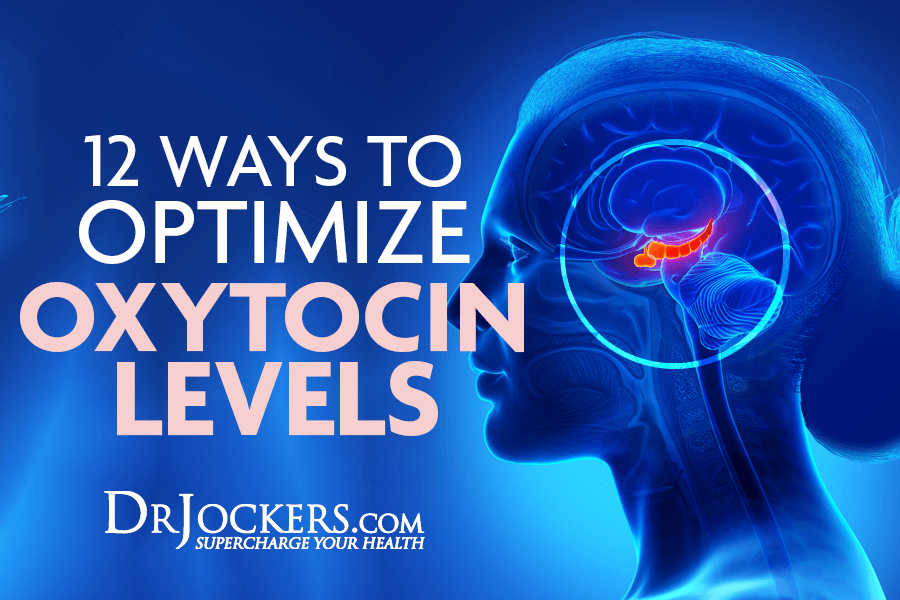 12 Ways to Optimize Oxytocin Levels for Mood & Happiness
12 Ways to Optimize Oxytocin Levels for Mood & Happiness
Oxytocin is a hormone and a neurotransmitter. It’s also called the love hormone and the empathy hormone. It plays a critical role in female reproductive function, sexual desire, orgasms, pregnancy, breastfeeding, and mother-baby bonding. It also helps to reduce stress, anxiety, and depression, and helps to support mood, happiness, trust, and connection. Oxytocin is essential for your health and wellness, and you can boost your oxytocin levels through simple natural strategies.
In this article, you will learn what oxytocin is and its many benefits. You will learn about the importance of this hormone during pregnancy. I will explain the problems with low oxytocin. And I will share 12 ways to optimize your oxytocin levels for mood, happiness, and stress support naturally.
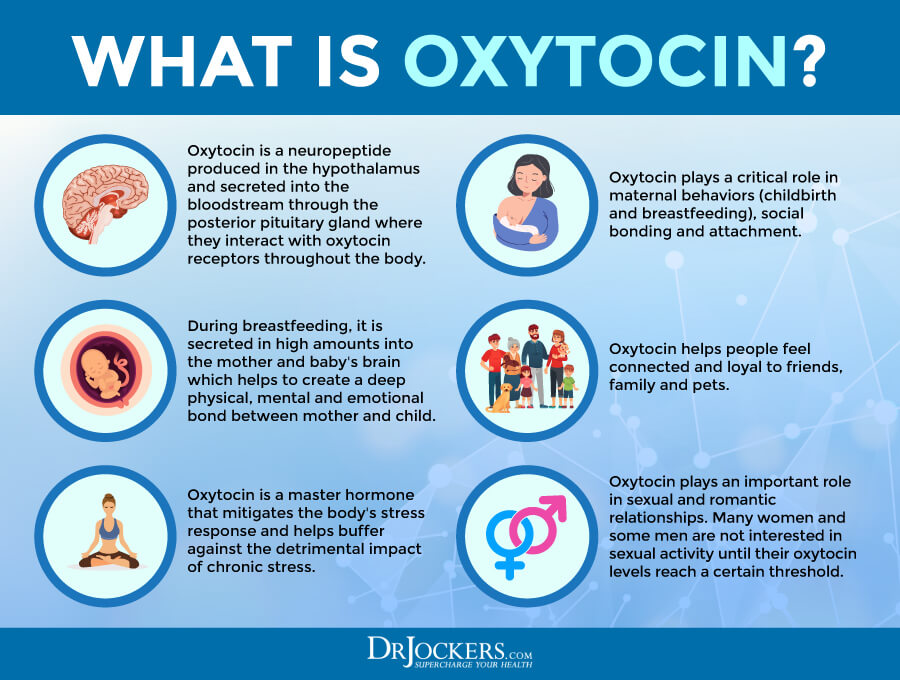
What Is Oxytocin
Oxytocin is a hormone and a neurotransmitter. It’s produced in your hypothalamus and secreted by your pituitary gland, which is located at the base of your brain. One of the major and most well-known roles of oxytocin is in female reproductive functions. As a 2011 review published in the Indian Journal of Endocrinology explains, it plays a role in sexual activity, orgasms, childbirth, breastfeeding, and bonding time (1).
Oxytocin is also known as the love hormone. A 2012 study published in Psychoneuroendocrinology found that oxytocin plays a role in the initial bonding time between a couple (2). New couples during the first 6 months of their relationship had higher levels of oxytocin than couples in the later stages of their relationship and single people not in a romantic relationship. It is essentially responsible for the honeymoon phase. According to the book, Endocrine and Reproductive Physiology, this hormone plays a role in erection and orgasm (3).
Beyond romantic partnerships, pregnancy, and the mother-baby connection, oxytocin has several other roles. It plays a critical role in your mental health by reducing stress and anxiety, improving social connections, and boosting your mood.
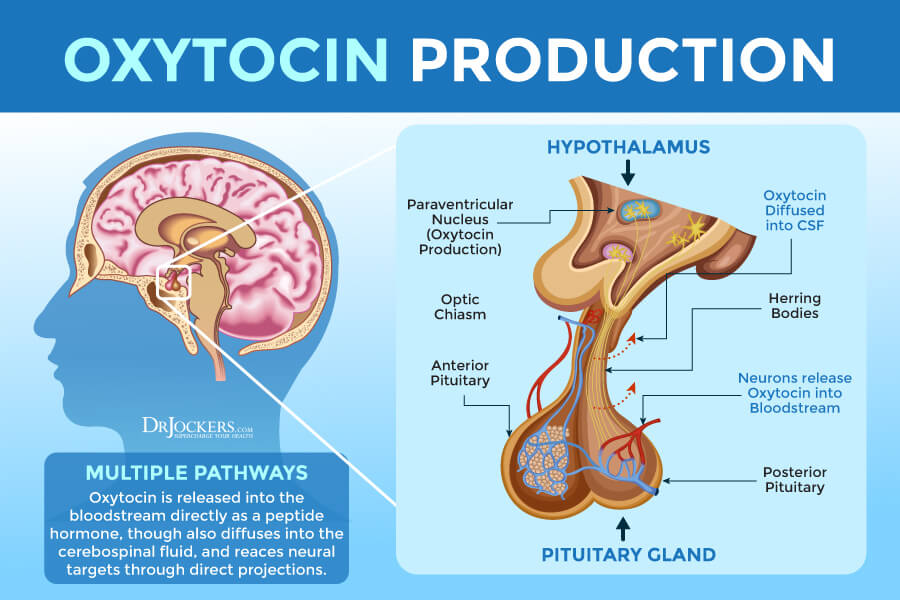
Oxytocin in Pregnancy
Oxytocin plays a critical role in bringing new babies into our world. As you just learned, oxytocin plays a role in the connection between parents and lovemaking that will essentially result in conception. Oxytocin also affects uterine motility, which may help sperm to reach their destination and achieve pregnancy (3). It also plays a role in pregnancy, childbirth, breastfeeding, and nurturing feelings and behaviors supporting the mother-baby bond (3).
When a woman gets pregnant, oxytocin levels increase gradually throughout the pregnancy. They may boost the mothers’ nurturing care for the baby inside their womb, and the excitement of waiting for their baby’s arrival.
Oxytocin levels significantly increase during the labor process. According to Endocrine and Reproductive Physiology, oxytocin increases uterine motility, helps to stimulate contractions that dilate the cervix and vagina to allow the baby to move down the birth canal, push out the placenta, and reduce bleeding to a minimum (3). Low levels of this hormone can slow or stop contraction, increase the length of the labor process, lead to significant bleeding at the placenta site after birth, and increase the need for medical intervention and support during and after labor.
Oxytocin can also support breastfeeding. The stimulation of the nipples during breastfeeding can lead to oxytocin release. Breastfeeding is not only critical for the nourishment of the baby but bonding and the mother-baby relationship.

According to a 2011 review published in the Indian Journal of Endocrinology, oxytocin helps stimulate maternal behavior and maternal care (1). This means that as their babies are born, mothers are naturally drawn to care for their babies.
This is not to downplay the role of parenting classes, books, and other support available for expecting and new mothers. However, know that the body is wiser than you think, and oxytocin is there to support even nervous new mothers.
Oxytocin also helps to support emotional bonding time. The same review has found that oxytocin helps bonding behavior, social recognition, and the making of group memories between mother and baby.
While this plays a critical role in the mother-baby relationship, it may also support father-baby bonding. According to the same review published in the Indian Journal of Endocrinology, based on animal models, oxytocin levels may also be higher in expecting and new fathers compared to child-free males (1).
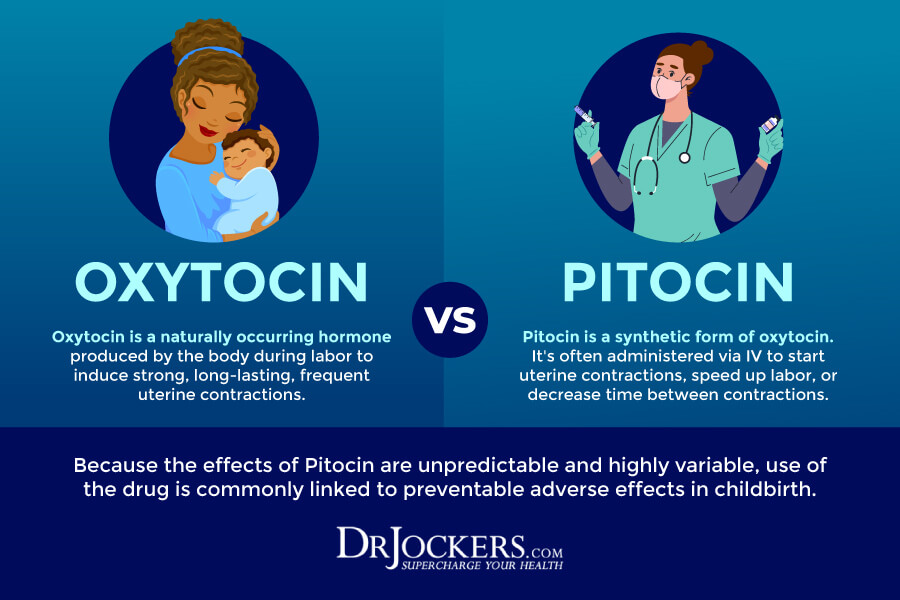
Oxytocin vs Pitocin
Before I move on to the benefits of oxytocin on mental health and happiness, I want to touch on the use of oxytocin as a medication. Understanding the role of oxytocin in childbirth, it is not surprising that prescription oxytocin injection (Pitocin) is sometimes used in hospital settings under medical supervision to trigger birth contractions or strengthen contractions during labor. They may also be used to decrease bleeding after delivery (4).
However, using oxytocin as a medication is not without risks. These injections can lead to rapid heartbeat, unusual bleeding, and other side effects. When given too much, it can increase the risk of rapid delivery and a ruptured uterus (4). Supporting your body’s natural supply is the best and safest for both mother and child. Later in this article, I will share some powerful strategies to improve your oxytocin levels naturally.
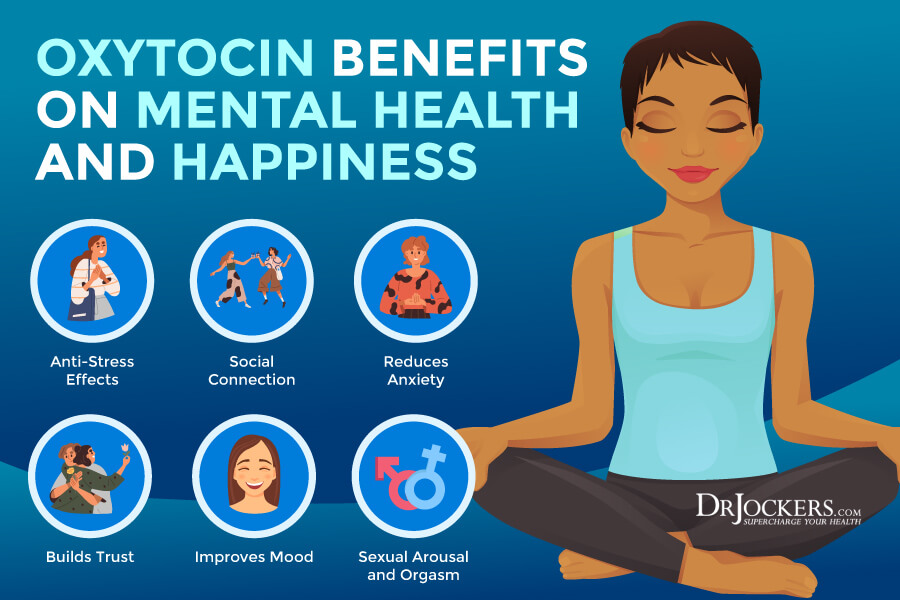
Oxytocin Benefits on Mental Health and Happiness
Oxytocin is not only important for mothers. Beyond pregnancy, childbirth, and mother-daughter bonding, oxytocin offers important benefits for mental health and happiness as well. Let’s look at the emotional and social benefits of this amazing neurohormone.
Anti-Stress Effects
Chronic stress is a silent killer in our modern society. It can increase the risk of chronic inflammation, mental health issues, chronic pain, chronic symptoms, and chronic disease. Brain oxytocin is a critical component in responding to and reducing stress.
According to a 2013 review published in EMBO Reports, oxytocin allows your body to adapt to highly emotional and emotionally taxing situations (5). A 2007 review published in Cell Metabolism also found that oxytocin can reduce the stress response, regulate emotions, and lower anxiety (6).

Social Connection
Social connection is essential for your mental health and daily life. It is also important for your physical health since social connections can help to reduce stress and inflammation and enhance overall well-being. I’ve already discussed the importance of oxytocin in bonding between mother and baby. But it goes beyond parental relationships.
A 2007 review published in Cell Metabolism also found that oxytocin can support social skills and behavior (6). They found that brain oxytocin supports social memory and social support, and may help to support social phobia. A 2011 review published in the Indian Journal of Endocrinology found that oxytocin can help to reduce social disorders (1). Both reviews have found that improving oxytocin levels can be beneficial for those with autism and obsessive-compulsive disorder.
Researchers at Tokyo University of Science found that many people with autism have a genetic mutation in the CAPS2 protein that helps regulate the release of oxytocin into the peripheral nervous system. This mutation is thought to reduce the beneficial impact of oxytocin on developing social connections, which can help explain the social disconnection many with autism experience. You can read more about this here.
Reduces Anxiety
Anxiety disorders affect about 40 million adults in the United States (7). There are also millions of others who experience some level of anxiety from time to time or regularly without an anxiety diagnosis. Brain oxytocin is one of your brain’s powerful weapons to reduce anxiety and improve your mental health.
A 2007 review published in Cell Metabolism found that oxytocin can decrease anxiety and support emotional regulation (6). According to a 2011 review published in the Indian Journal of Endocrinology, oxytocin can have calming effects on anxiety and anxiety disorders (1).
A 2020 review published in Advances in Experimental Medicine and Biology found that oxytocin may help to reduce psychiatric disorders, including anxiety, depression, schizophrenia, and autism (8). This may be happening because of the anxiolytic effects of oxytocin that influence neurobehavioral mechanisms, including social cognition and fear learning. The review has found that this hormone is particularly powerful for separation anxiety disorder and social anxiety disorder.

Builds Trust
Trust is incredibly important for not only our mental health but also our social health. Trust allows relationships, including couples, families, and friendships, to thrive. It also allows organizations, communities, and societies to function and flourish. Trust allows cooperation and generosity, while mistrust leads to conflict, stress, aggression, and all kinds of problems.
Oxytocin plays a critical role in developing a healthy dose of trust. A 2007 review published in Cell Metabolism also found that this hormone can help to build trust (6). A 2020 study published in Nature Human Behavior found that oxytocin helps people to trust in strangers and plays an important role in trusting behavior (9).
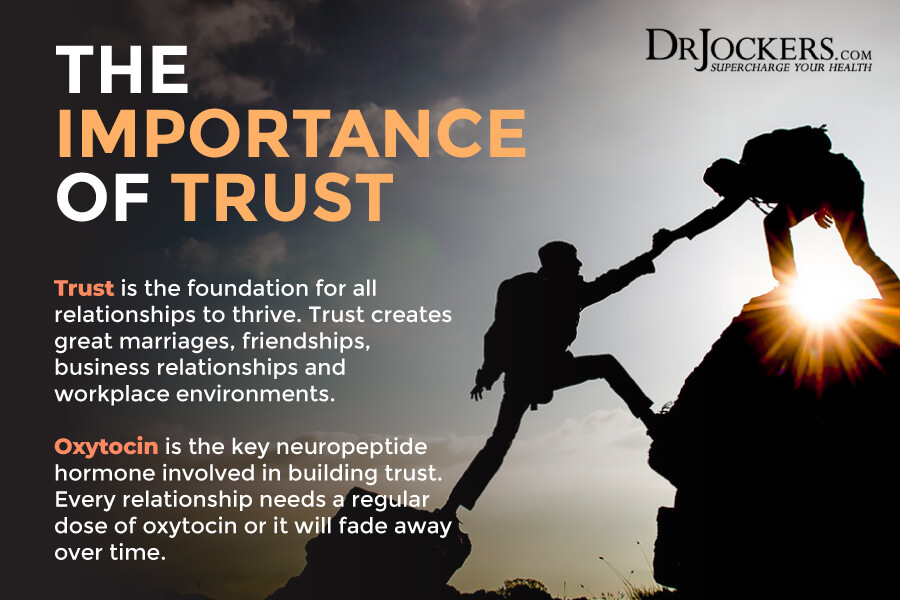
Improves Mood
Nearly 7 percent of people in the United States have experienced major depressive disorder (7). This is only one form of depression and mood disorder that affects millions of people. Millions of others without a diagnosed depression struggle with occasional or regular sadness, bad mood, or mood fluctuations. Improving
A 2013 review published in Harvard Reviews in Psychiatry found that oxytocin dysfunction may play a role in psychiatric disorders, including depression (10). A 2020 review published in Advances in Experimental Medicine and Biology found that oxytocin may help to lower the risk of psychiatric disorders, including depression and anxiety (8).
A 2019 systematic review of randomized controlled trials published in Clinical Psychopharmacology and Neuroscience found that oxytocin may play a role in improving depressive and anxiety disorders (11).
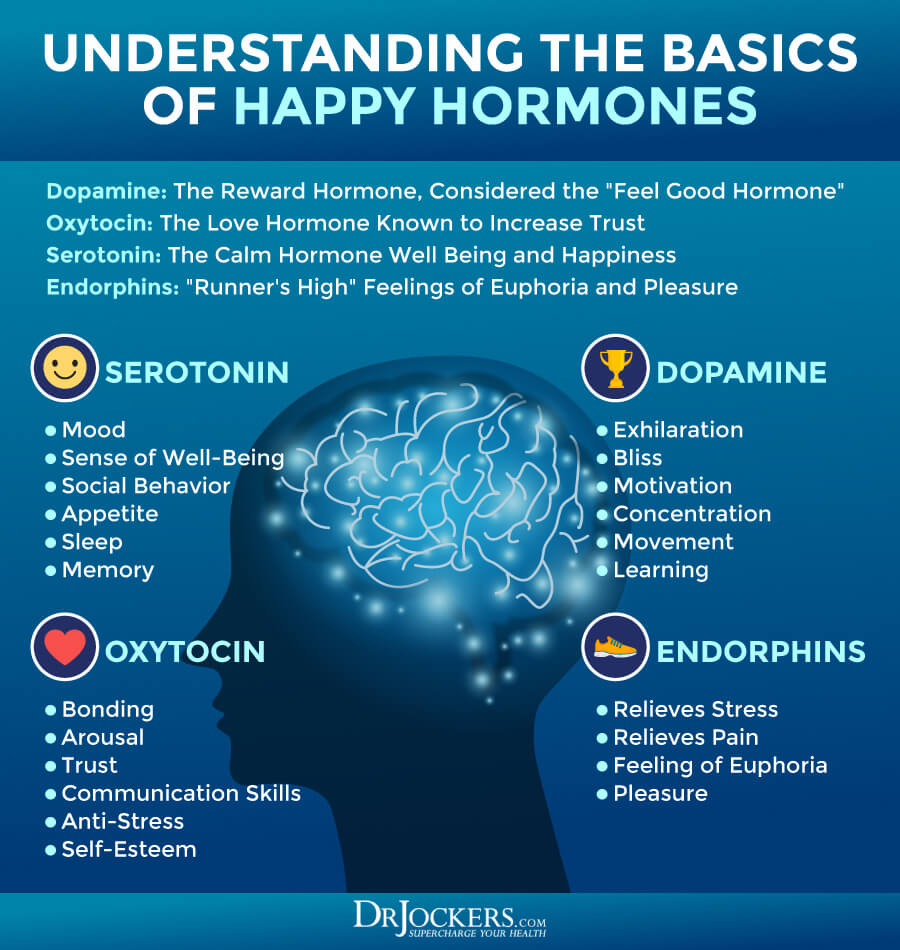
Sexual Arousal and Orgasm
You already know about the importance of oxytocins in the initial connection and honeymoon phase between a new couple (2). It is also critical for sexual connection, sexual arousal, and orgasms. Oxytocin may help sexual arousal and intensify orgasms in both men and women.
According to a 2014 book, Endocrine and Reproductive Physiology, oxytocin also plays a role in erection and orgasm (3). Sexual activities trigger the release of oxytocin, which may affect both erection and orgasm. A 2015 study published in Fertility and Sterility found that oxytocin can help women with sexual arousal and sexual dysfunction (12). A 2007 case study published in The Journal of Sexual Medicine found that oxytocin can also help male anorgasmia (13). If you are trying to get pregnant, it’s helpful to understand that oxytocin also affects uterine motility, which may help sperm to reach the egg (3).
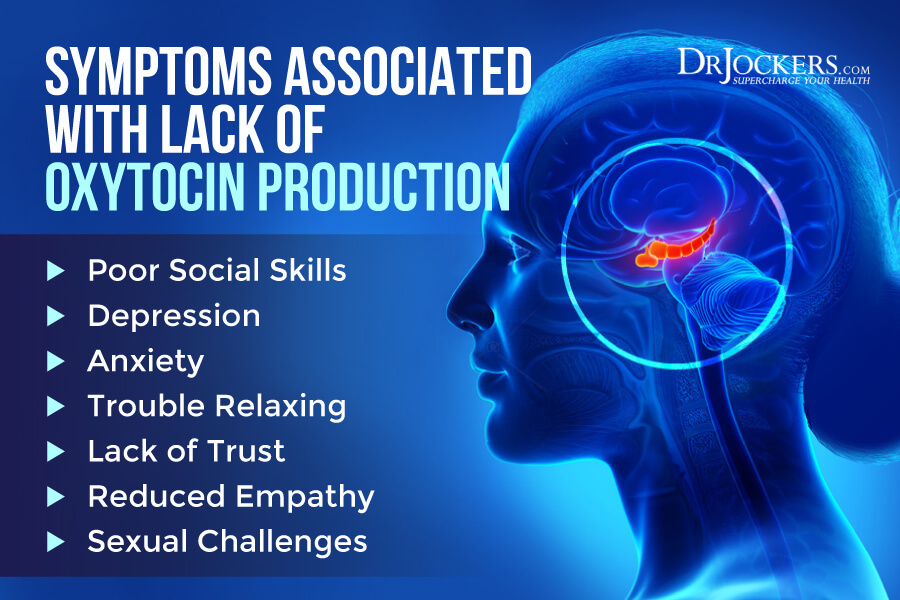
Problems with Lack of Oxytocin
Oxytocin is critical for pregnancy, childbirth, mental health, and happiness. Lack of oxytocin can lead to a variety of issues, including:
- Slow or stopped contractions during labor
- Increased length of labor
- Excessive bleeding at the placenta site after birth
- Problems with milk-ejection reflex and breastfeeding
- Difficulty bonding between mother and baby
- Poor social functioning
- Low mood
- Depressive disorders
- Anxiety disorder
- Psychological instability
- Poor social functioning related to autism
- Increased stress and difficulty relaxing
- Difficulty trusting or lack of trust
- Reduced empathy
- Problems with sexual arousal
- Difficulty reaching orgasm
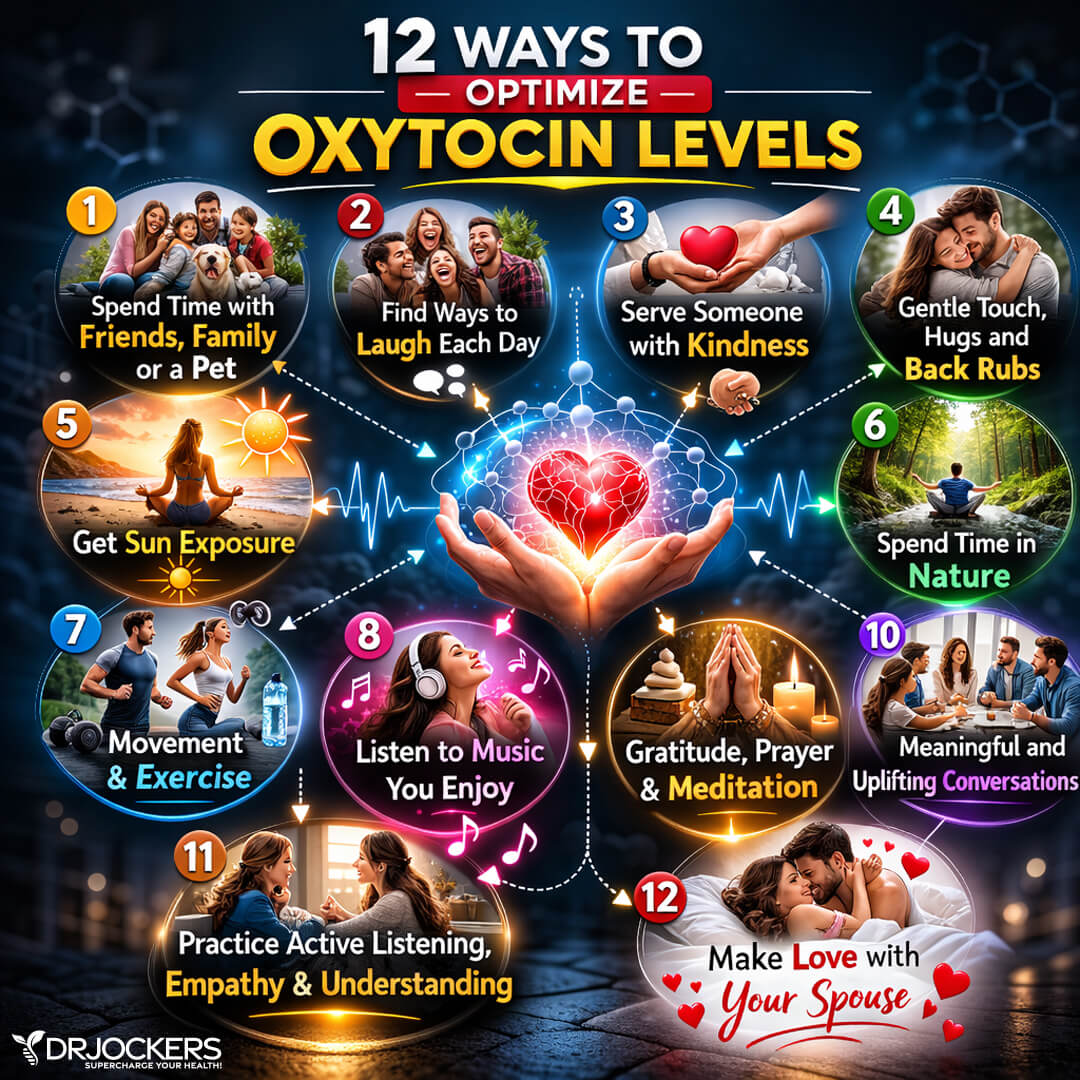
12 Ways to Optimize Oxytocin Levels
Improving your oxytocin levels is critical for your mental health and well-being. Here is what I recommend to optimize your oxytocin levels:
Spend Time with Friends, Family, or a Pet
One of the best ways to increase oxytocin is to spend time with your friends, family, or pets. Connection with friends and family can make a true difference in your emotional well-being. Social connection and support can make you feel less alone. Positive interactions and laughing together can increase oxytocin. So do conversations.
Emphatic listening improves bonding, connection, and quality time. Even time with pets can increase oxytocin. A 2015 article in Frontiers in Psychology found that playing with and petting a dog can increase oxytocin and help you feel better (14). This article here goes into great detail on the Anatomy of Dog Love.

Laughter
A 2017 review published in the Journal of Neuroscience found that laughter can release happy chemicals and endorphins (15). However, laughter can also cause the release of two other important hormones for your mood, dopamine and oxytocin. Laughing with other people is especially beneficial as it also builds connections.
Don’t take life so seriously. When connecting with others, find time to laugh. Go to a comedy show, tell a joke, or find a fun activity that triggers laughter. Even being around happy babies and kids can help. A 2012 study published in Neuropharmacology found that even infant laughter releases oxytocin and boosts brain function (16).

Serve Someone With Kindness
Serving someone with kindness and doing something with others can also increase oxytocin and boost happiness and emotional well-being. A 2010 study published in The Journal of Social Psychology found that practicing only 10 days of daily random acts of kindness improved the self-reported life satisfaction of participants (17).
Kind acts can not only brighten up someone else’s day but also improve your own happiness as well. Offer a random compliment. Offer to help your neighbor with their yard work. Buy an unexpected gift for someone. Volunteer or support your favorite cause.
Gentle Touch, Hugs & Back Rubs
Gentle physical touch, hugs, and back rubs can increase oxytocin levels. So can massages. According to a 2012 study published in Alternative Therapies in Health and Medicine, only 15 minutes of massage can improve oxytocin levels and help relaxation (18).
A 2015 review published in Frontiers in Psychology found that the person giving the massage can also experience an oxytocin boost (19). Hug each other or try a massage train with friends. Offer a massage to your partner. Get a professional massage regularly.

Get Sun Exposure
A 2014 study published in FASEB Journal found that vitamin D helps serotonin synthesis and oxytocin levels (20). A 2016 review published in Nutrients has also found that vitamin D plays an important role in vitamin D levels and brain health, and may be particularly beneficial for those with autism (21).
Sun exposure helps boost vitamin D levels in your body. Aim to get at least 15 to 30 minutes of sun exposure each day, as long as the weather allows it.

Spend Time in Nature
Spending time in nature can also help boost oxytocin and improve your mental health. A 2020 review published in Frontiers in Psychology found that spending time in nature can reduce stress, anxiety, and depression (22).
I recommend spending regular time in nature. Hang out in your yard and take a stroll in a local park. Go to the forest, the mountains, or the beach. Hug a tree. Walk barefoot in the grass to do some grounding. Do some gardening or go fruit picking.

Movement & Exercise
Movement and exercise are also essential for your emotional, mental, and physical health, including your oxytocin levels. A 2019 review published in the Balkan Medical Journal found that regular aerobic exercise can improve oxytocin, reduce anxiety, and boost empathy (23). It turns out that only 10-minutes of running may boost your levels of this key hormone.
I recommend that you stay active throughout the day. Stretch regularly, take regular walks, dance to your favorite songs, hop on your bike, play with your kids, or jump on the trampoline for a bit. Exercise at least 5 days a week for 20 to 30 minutes. Mix up cardiovascular workouts, strength and resistance training, and low-impact activities.
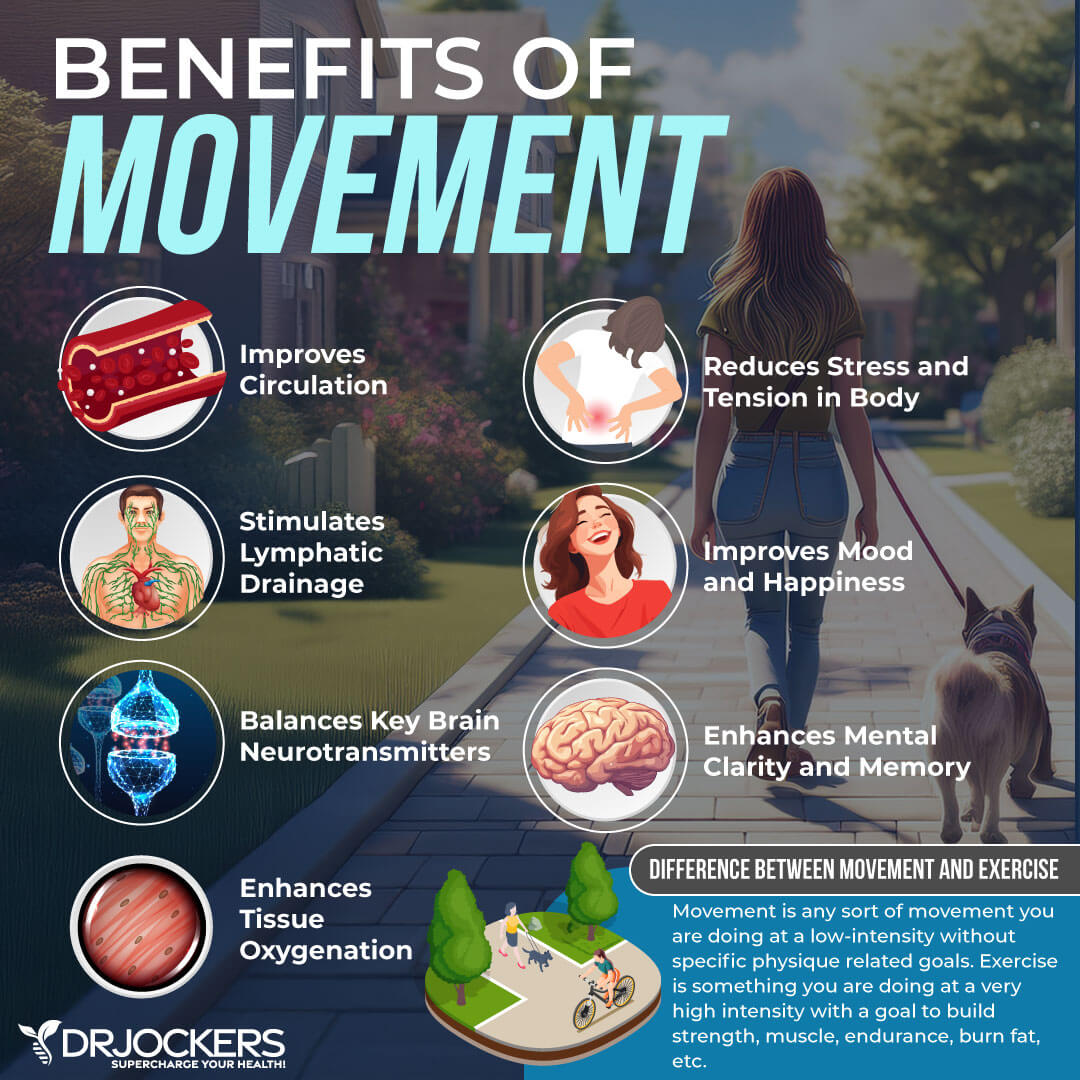
Listen to Music You Enjoy
Music is another great way to boost oxytocin. A 2009 randomized control trial has found that using soothing music after an open-heart surgery increased oxytocin and supported recovery (23).
A 2015 study published in Frontiers in Human Neuroscience has found that jazz singers experienced a higher boost of oxytocin during an improvised performance versus a composed one because of the communication, trust, cooperation, and other social behaviors it involved (24). I recommend listening to soothing or uplifting music regularly. Don’t be shy to sing along or dance. If you play any instruments, it’s time to practice for an oxytocin boost.
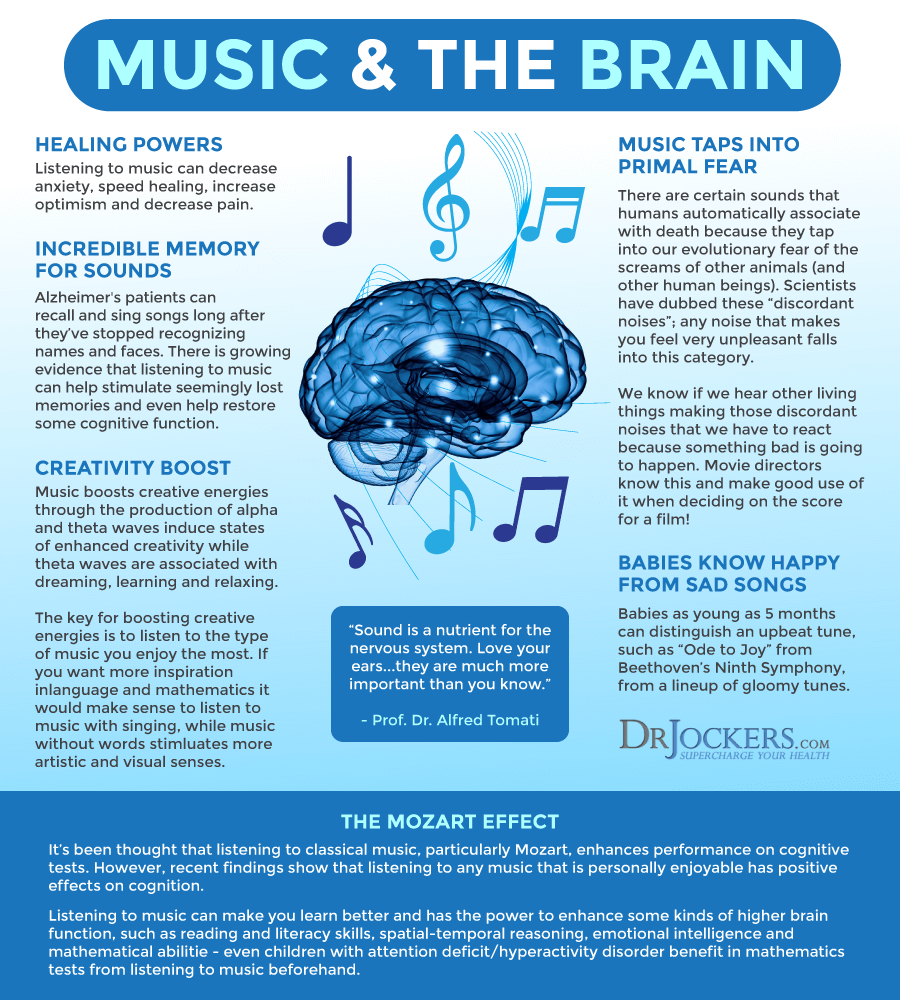
Gratitude, Prayer, and Meditation
Practicing gratitude, prayer, and meditation daily can help to lower stress and anxiety. A 2019 study published in Biophysics and Physicobiology has found that mindfulness meditation can increase oxytocin and reduce stress (25). It can boost your mood and increase compassion toward both yourself and other people.
Start and end your day with a gratitude practice and stop throughout the day to be thankful. Practice prayer according to your personal spiritual practices. Practice meditation for at least 5 minutes each morning. Loving-kindness meditation is a particularly great way to direct love and goodwill towards others. You may also offer up a prayer for someone or the world.
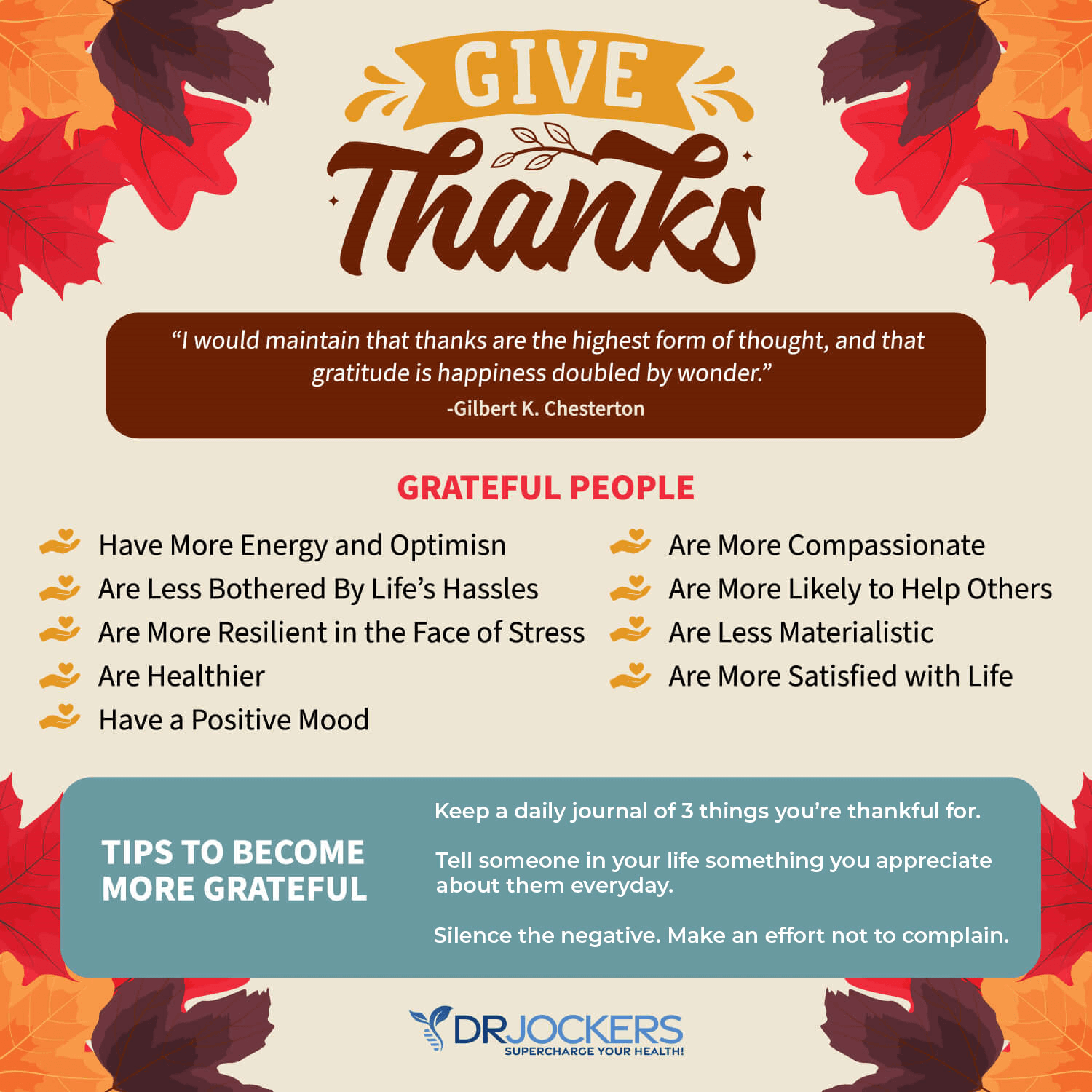
Meaningful & Uplifting Conversations
Meaningful and uplifting conversations are another way to connect and optimize your oxytocin levels. A 2012 study published in Evolution of Human Behavior has found that using speech has greater benefits over instant messages (26). Researchers found that participant girls communicating with their mother over the phone experienced oxytocin release, while those using instant messages did not.
Ideally, you want to meet with your friends and family in person for some real, meaningful, and uplifting conversations. However, if it’s not possible due to distance, time, or other reasons, make sure to choose video calls or the telephone over chatting or emails.
Practice Active Listening, Empathy & Understanding
As you are having a conversation or connecting with other people, practice active listening, empathy, and understanding instead of just chatting away or already thinking or your response. A 2018 study published in Frontiers of Neuroscience found that emotional empathy can increase oxytocin and positively influence amygdala and limbic system activity (27).
Make eye contact. Listen and don’t interrupt. Practice empathy. Offer understanding and kind words, instead of advice.

Make Love with Your Spouse
You’ve already learned about what role oxytocin plays in the initial connection between couples, sexual connection, sexual arousal, and orgasms (2, 3, 12). Making love with your spouse is a great way to boost oxytocin, increase connection, and improve happiness and wellness.
Remember, most women generally need certain levels of oxytocin before they are interested in having sex. They need a connection first. Understand each other’s love language. Care for each other throughout the day.
Connect through words, kindness, and physical touch. Begin with foreplay instead of jumping right into sex. This connection before is not only critical for most women and even some men, but can also increase oxytocin in both parties.

3 Key Supplements to Support Oxytocin Levels
You can also support your oxytocin levels with 3 key supplements. Here is what I recommend:
Vitamin D
A 2014 study published in the FASEB Journal found that vitamin D helps serotonin synthesis and oxytocin activation (20). A 2016 review published in Nutrients has also found that vitamin D plays an important role in vitamin D levels and brain health (21).
Pairing vitamin D3 with vitamin K2 helps improve calcium absorption and inflammation control. I recommend taking a vitamin D3 supplement with at least 3,000-5,000 IU’s of vitamin D3 and at least 90 mcg of vitamin K2. I highly recommend this Vitamin D3/K2 Power.
Typically, taking 1,000 IU per 25 lbs. of body weight will help you get your levels into a healthy range. You want to test your vitamin D levels at least 1-2 times each year and get your levels between 50-100 ng/ml. It has been hypothesized that a therapeutic level for major health conditions is going to be between 70-100 ng/ml.

Vitamin C
Vitamin C is not only critical for your immune health. It is a cofactor in the production of oxytocin. A 1987 study published in the Journal of Endocrinology found that vitamin C helps increase oxytocin (28).
It is even better when combined with bioflavonoids. I recommend using Super C with vitamin C and bioflavonoids daily for healthy oxytocin levels.
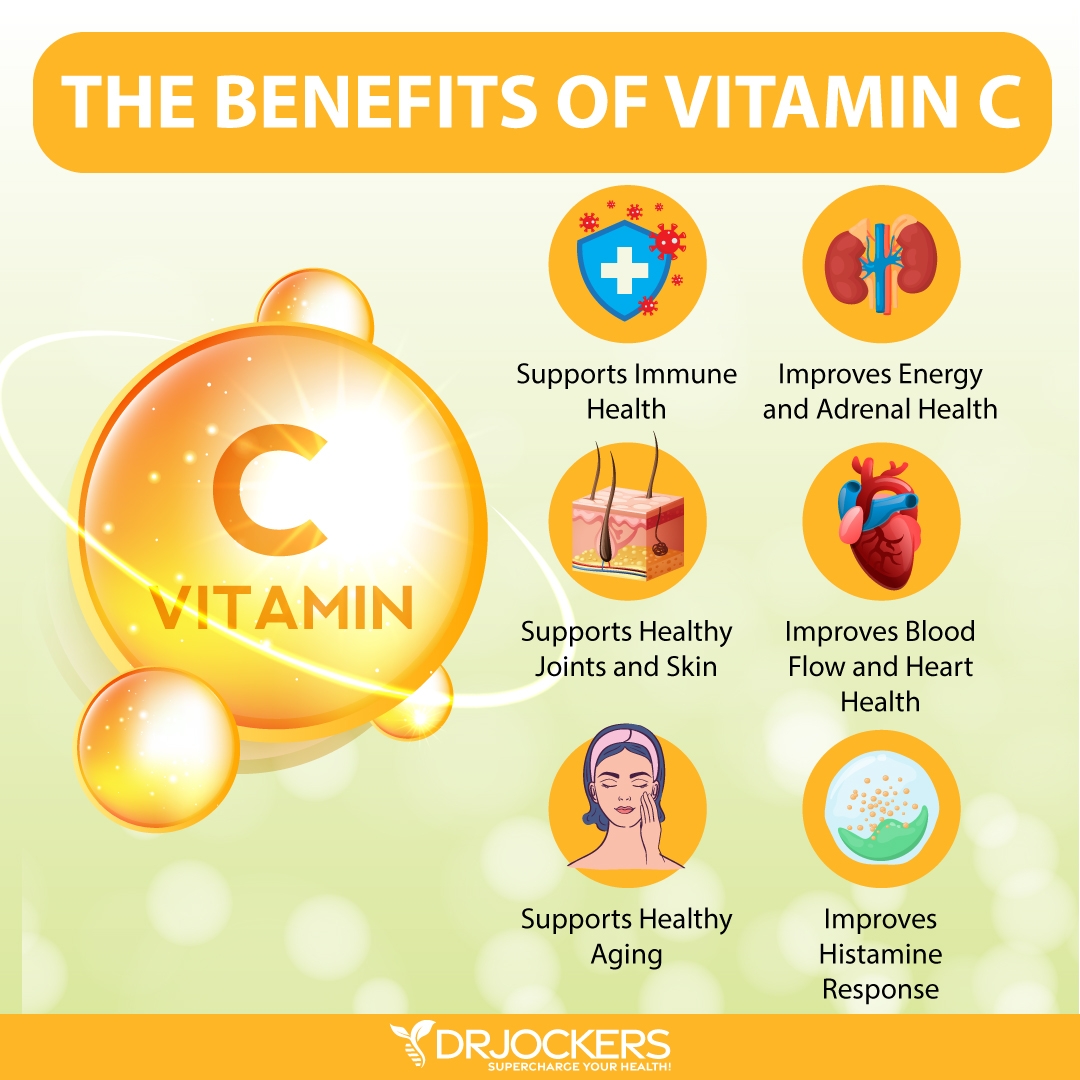
Magnesium
Magnesium is a mineral that’s essential for brain and mental health, muscle relaxation, sleep, and other areas of your health. It is also critical for the oxytocin receptor. A 1989 study published in the Biochemical Journal found that magnesium is important for oxytocin affinity (29).
A more recent, 2001 review published in Physiological Review explained how important this oxytocin receptor system is for labor, breastfeeding, and other areas of your health (30). To improve your magnesium levels, optimize oxytocin levels, and support your brain health, mental health, and relaxation, I recommend taking Brain Calm Magnesium daily.
Final Thoughts
Oxytocin is a hormone that plays an important role in female reproductive function, sexual desire, orgasms, pregnancy, breastfeeding, and mother-baby bonding. It helps to decrease stress, anxiety, and depression. It also helps to support a good mood, happiness, trust, and connection.
Oxytocin is essential for your health and wellness and you can boost your levels through simple natural strategies. To optimize your oxytocin levels for mood, happiness, and stress support naturally, I recommend that you follow the steps and try the supplements I shared in this article.
If you want to work with a functional health coach, I recommend this article with tips on how to find a great coach. Our website offers long-distance functional health coaching programs with our world-class team of health coaches. For further support with your health and other goals, just reach out—our fantastic coaches are here to support your journey.
Inflammation Crushing Ebundle
The Inflammation Crushing Ebundle is designed to help you improve your brain, liver, immune system and discover the healing strategies, foods and recipes to burn fat, reduce inflammation and Thrive in Life!
As a doctor of natural medicine, I have spent the past 20 years studying the best healing strategies and worked with hundreds of coaching clients, helping them overcome chronic health conditions and optimize their overall health.
In our Inflammation Crushing Ebundle, I have put together my very best strategies to reduce inflammation and optimize your healing potential. Take a look at what you will get inside these valuable guides below!





Hello Dr Jockers,
A very interesting article – different ways to enhance oxytocin levels. Apart from all those ways, you have given there is one more interesting way which increases the levels of oxytocin: It is by the restoration of Lactobacillus reuteri,(with the ATCC PTA 6475 strain), which produces oxytocin, a French research group demonstrated that oxytocin stimulates chondrocytes, the cells that build cartilage.
Great information. Thank you for sharing!